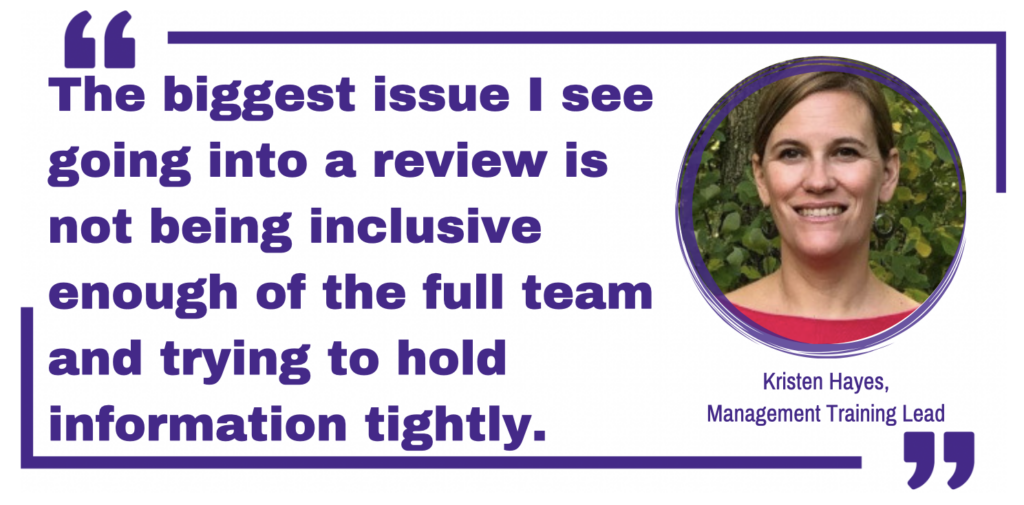The right preparation is key to a successful review process, so Early Insights talked to Kristen Hayes, Management Training Lead, and Dr. Desiree Del-Zio, CQI Training Lead, about mistakes to avoid.
#1: The wrong preparation
If leaders don’t understand the review protocol, then they may not prepare themselves to put their best foot forward. Del-Zio says this can happen if “they don’t know how to read keywords like strategies, assistance and implementation or they fail to read into the protocol and truly understand what the OHS is looking for.” In that scenario, leaders may prepare by asking each other protocol questions they don’t fully understand. “If they don’t understand the question, they’re asking the wrong questions and answering the wrong question,” Del-Zio adds.
#2: Preparing in a silo
“For me, the biggest issue I see going into a review is not being inclusive enough of the full team and trying to hold information tightly,” says Hayes. When leaders don’t include their staff in preparations for federal reviews, it’s often because they believe they’ll be able to resolve concerns themselves. However, this creates a missed opportunity for management teams to gain continuing education and professional development. Including staff in federal reviews can help with succession planning as they get a broader understanding of the organization. “Because reviews don’t happen every year, once it’s missed, it doesn’t come back around that frequently,” Hayes adds.

#3: Letting fear take over
Some leaders view federal reviews with dread, and that feeling can trickle down to staff, who sense their discomfort. But as Hayes points out, “it should be an opportunity to engage in continuous learning. It should be an opportunity to highlight promising practices. it should be an opportunity to showcase with pride.” Organizations that approach reviews as a learning opportunity instead of a necessary evil can help breed a culture of trust and ongoing enrichment.
#4: Lack of organizational-level data
As a former federal reviewer, Del-Zio has seen scenarios where teachers “can talk about each child’s progress towards school readiness goals, but the organization cannot talk about all of the children’s collective progress.” With the Office of Head Start’s greater emphasis on data and quality improvement, programs need to have high-level data ready to demonstrate progress toward the compliance requirements for each of the service areas.
#5: Lack of measurement
Some programs will “talk about a wonderful group of folks that do all this great work together, but there’s no ability to demonstrate the outcome,” Del-Zio says. “It’s a lack of measurement and evaluation systems.” Instead of sharing their daily processes and practices, programs need to take a step back. “Think in terms of why these practices are in place, and how their particular community reflects the need for those action steps,” Del-Zio says.

#6: Questionable safety and supervision practices
Safety is a huge priority for the Office of Head Start. When reviewers observe teachers leaving children unattended for any period of time or with only one teacher in a classroom while another leaves the room, that causes concern, because they know that those practices are likely habitual. “If you’re doing it while we’re standing right here, you’re doing it all the time, because you think it’s normal,” Del-Zio says.
#7: No appropriate segregation of duties
Federal reviews also examine a program’s fiscal practices, so they want to see safeguards against financial fraud. “It’s typical to see a very small fiscal team when you have 40 children enrolled in the program and you’re dealing with a million dollars,” Del-Zio says. “Whereas if you have a giant program with 7,000 slots and $50 million, you’d expect to see a very different structure. One person can’t handle $50 million, but both of them must have established segregations of duty.” In a smaller program, if the same person writes a purchase request, purchases supplies, and writes a check to pay for the supplies, it creates potential opportunities for fraud. Programs need systems in place to ensure appropriate segregation of duties and reduce the potential for fraud.
In the past, a federal review could be managed as a one-time event. But with the current standards and review protocol, review readiness requires the right systems and mindset. Teams that are proactive and have these systems in place are always ready for a federal review instead of needing to panic as it approaches. Continuous quality improvement embraces this mindset, because staff are continually digesting information, asking the important questions, and looking ahead.


